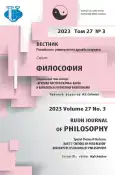From Monism to Pluralism: Cassirer’s Interpretation of Kant
- Authors: Katsur I.1
-
Affiliations:
- Hebrew University of Jerusalem
- Issue: Vol 27, No 3 (2023): KANT’S “CRITIQUE OF PURE REASON” AND WAYS OF ITS READING BY PHILOSOPHERS
- Pages: 556-567
- Section: KANT’S “CRITIQUE OF PURE REASON” AND WAYS OF ITS READING BY PHILOSOPHERS
- URL: https://journal-vniispk.ru/2313-2302/article/view/325236
- DOI: https://doi.org/10.22363/2313-2302-2023-27-3-556-567
- EDN: https://elibrary.ru/GAEIAR
- ID: 325236
Cite item
Full Text
Abstract
Kant’s theory of cognition aimed to explain the possibility of scientific knowledge. Aesthetics and life science were not considered by Kant in the context of cognition. By contrast, Cassirer set himself a philosophical task to extend Kant’s theory of cognition to all forms of culture, including pre-scientific knowledge and aesthetics. The present study demonstrates how Cassirer explained the possibility of different objective forms, named symbolic, by employing and transforming Kant’s theory of cognition. For this goal, Cassirer took the following steps: modified the definitions of a priori synthesis (the act of understanding) and pure intuition (the forms of space and time) - main building blocks of Kant’s cognition; indicated the necessary correlation of intuition and synthesis; characterized a priori synthesis and the intuition as notions which include contradicted meanings. Cassirer called this contradiction “twofold oppositions” as characteristic of a priori synthesis. The first argument of the article is that the possibility of various synthetic acts is rooted in the nature of a priori synthesis which carries together two different meanings: the act of uniting elements and the initial unity. One synthetic act forms the world of nature and is connected to scientific space and time, and the other is the product of immediate perceptional space and time, from which the world of myth and aesthetics appears. Thus, Cassirer expanded the scope of “pure” synthesis. The second argument is that Cassirer specified a priori synthesis and pure intuition as a functional concept. The functional concept belongs to the model of concept as-relation that Cassirer has elaborated. It includes moments that are separated and united simultaneously. This definition of concept breaks the rules of consistency. The concept of as-relation justifies the contradictory characteristics of a priori synthesis and pure intuition, which include both the combination of moments in a synthesizing act and the initial unity of intuition.
About the authors
Ira Katsur
Hebrew University of Jerusalem
Author for correspondence.
Email: ira.kachur@gmail.com
ORCID iD: 0000-0002-8610-0293
PhD in Philosophy, Researcher, Center for German Studies
Edmond J. Safra Campus, Givat Ram, 9190401, Jerusalem, IsraelReferences
- Kant I. Critique of Pure Reason. United Kingdom: Cambridge University Press; 1998.
- Heine H. Religion and Philosophy in Germany. New York: State University of New York Press; 1986.
- Cassirer E. Kant’s Life and Thought. New Haven: Yale University Press; 1981.
- Cassirer E. The Philosophy of Symbolic Forms: Language. New Haven: Yale University Press; 1955.
- Cassirer E. The Philosophy of Symbolic Forms: Mythical Thought. New Haven: Yale University Press; 1955.
- Verene DP. Kant, Hegel, and Cassirer: The Origins of the Philosophy of Symbolic Forms. Journal of the History of Ideas. 1969;30(1):33-46. https://doi.org/10.2307/2708243
- Krois JM. Cassirer: Symbolic Forms and History. New Haven: Yale University Press; 1987.
- Windelband W. Die Geschichte der neueren Philosophie in ihrem Zusammenhange mit der allgemeinen Kultur und den besonderen Wissenschaften. Leipzig: Breitkopf & Härtel; 1907.
- Hamburg CH. Symbol, and Reality: Studies in the Philosophy of Ernst Cassirer. The Hague: M. Nijhoff; 1970.
- Cassirer E. Substance and Function and Einstein’s Theory of Relativity. New York: Dover Publications; 1953.
- Katsur I(I). Cassirer’s Revision of Cohen. In: Proceedings of the 4th International Conference on Contemporary Education, Social Sciences and Humanities (ICCESSH 2019); Atlantis Press. 2019:170-175. https://doi.org/10.2991/iccessh-19.2019.40
- Friedman M. A Parting of the Ways: Carnap, Cassirer, and Heidegger. Chicago: Open Court; 2000.
- Cassirer E. Erkenntnistheorie nebst den Grenzfragen der Logik. Vol. 9. Recki B, editor. In: Ernst Cassirer: Gesammelte Werke [CD-ROM]. Hamburger Ausgabe; 2009. S. 139-201.
- Cassirer E. Mythic, Aesthetic and Theoretical space. Man and World. 1969;(2):3-17. https://doi.org/10.1007/BF01247075
- Katsur I(I). Gestalt Psychology as a Missing Link in Ernst Cassirer’s Mythical Symbolic Form. Human Studies. 2018;(41):41-57. https://doi.org/10.1007/s10746-017-9454-4
- Cassirer E. Zur Logik des Symbolbegriffs. Vol. 9. Recki B, editor. In: Ernst Cassirer: Gesammelte Werke [CD-ROM]. Hamburger Ausgabe; 2009. S. 112-140.
- Marc-Wogau K. Der Symbolbegriff in der Philosophie Ernst Cassirers. Theoria. 1936;(2):279-332.
- Cassirer E. Language and Art II. In: Symbol, Myth and Culture: Essays and Lectures of Ernst Cassirer 1935-1945. Verene DP, editor. New Haven: Yale University Press; 1979.
- Cassirer E. The Metaphysics of Symbolic Forms (including the text of Cassirer’s manuscript on Basis Phenomena). Krois JM, Verene DP, editors. New Haven: Yale University Press; 1996.
Supplementary files









